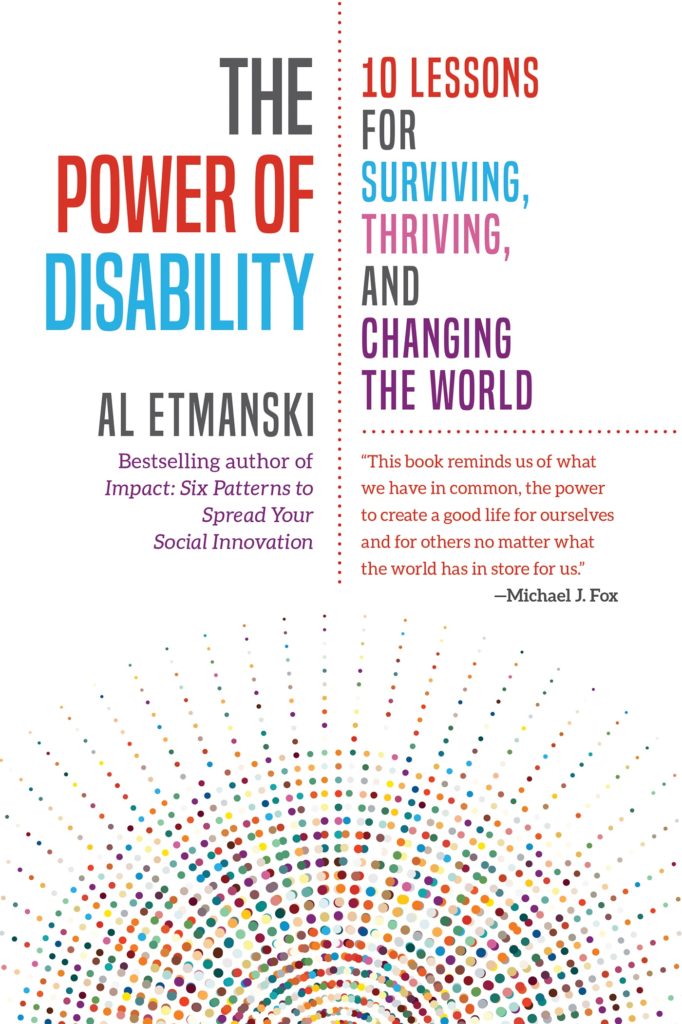by Wanda Deschamps (June 9, 2020)
The Power of Disability: 10 Lessons for Surviving, Thriving, and Changing the World, Al Etmanksi, Berrett-Koehler Publishers, February 5, 2020, 216 pp., $23.46

Power and disability conflated by a book title. Our society conditions us to believe that disability renders individuals powerless therefore The Power of Disability is equally provocative and intriguing. So is its author.
Al Etmanski was introduced to the world of disability when his eldest daughter Liz was born with Down’s syndrome. Appropriately, our first personal connection with him in the book’s introduction is his account as a proud father. While attending Liz’s first stage performance, he writes that he was learning his own life lesson and that his daughter was his teacher.
“She began, snatching from her memory words and fragments of conversation she had absorbed throughout the conference. She served them back as spoken word poetry. The crowd cheered in recognition. She beamed.”
Understandably his assessment of her was that she was “… more than getting by. Without me.”
Etmamski begins his preface by offering that it is almost impossible to be untouched by disability.
“There is a pretty good chance you are directly or indirectly connected to the power of disability. The majority of people are…one-seventh of the people on the planet have a disability, which makes people with disabilities the largest minority group in the world.”
The incredible accomplishments of individuals with disabilities, in some cases seemingly at all odds, is the main message of The Power of Disability. The book features 100 stories that cover a range of topics from sex, drugs and rock and roll, and everything in between. Disability is the celebrated theme at the centre of each account not a source of taboo, sympathy or stigma as it has so often been presented through history, literature and media. The stories are punctuated by chapters labelled Ten Lessons for Surviving and Thriving and Changing the World. The disability journeys of individuals serve as the teachings.
Perplexing it is that the world still suffers from such a limited understanding of disability, even in 2020. Part of this may be attributed to our lack of knowledge of what constitutes disability: the majority of cases are invisible. One of the ways in which Etmanski’s stories help is by informing us of instances of disability that we may never have considered as such. Epileptic seizures are a residual effect of Canadian music legend Neil Young’s polio affliction and the source of his nickname Shakey. The late Montreal born, world acclaimed, song-writing sensation, Leonard Cohen battled intermittent debilitating depression.
These and 98 other stories provide insight into why disability can and does intersect with all individual dimensions: gender, race, religion, educational background, career, geographic location and political belief. While touching on these, Etmanski highlights individual resilience and perseverance in sight of a goal to contribute to one’s full potential through their talent and skills. This is why disability employment rises to the top as an area requiring closer attention and immediate action.
Despite their talents and skills, the majority of individuals with disability worldwide are either unemployed or under-employed. Etmanski explains that Irish born disability leader, Caroline Casey refuses to let this vast inequity go ignored any longer.
“If disability is not on your agenda, neither is diversity,” she says.
The bold statement opens her story The Elephant in the Room within Lesson #5: All Means All, and Ms. Casey has the bona fides and credibility to make this strong claim.
“In 2019, she made history at the World Economic Forum’s annual summit in Davos. She launched ‘The Valuable 500,’ a call to action for five hundred global business leaders to put disability issues on their board agenda.”
She brought with her two forces in business from two different parts of the globe. “Paul Polmon of Unilever and Richard Branson of Virgin were the founding Valuable 500 leaders.” According to The Economic Times, as of May 13, 2020, 400 companies had signed up as The Leaders of the Inclusion Revolution on the Valuable 500 website. This is strong evidence to indicate that we are headed towards a more inclusive society that will eventually bring individuals with disabilities into fuller participation in the workforce.

The timing of The Power of Disability is fortuitous for those championing for disability rights. And for those who wish to learn more about “the world’s largest minority” it is both an opportunity to begin to understand and an invitation to move to action to celebrate, recognize, empower and improve lives.
Ultimately, if your vision aligns with Caroline Casey’s, “…a world where everyone belongs” then Etmanski’s words may resonate most of all: “This isn’t really a book about disability. It’s a book about life.”
(Wanda Deschamps is founder and principal of Liberty Co, a consultancy working to increase the participation level of the neurodiverse population in the workforce.)
Leave a Reply
You must be logged in to post a comment.